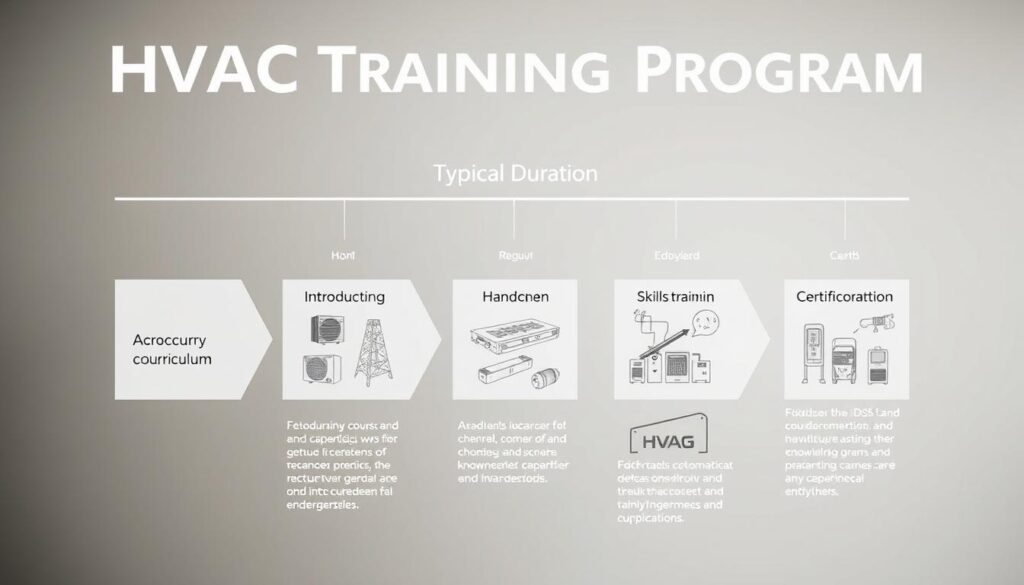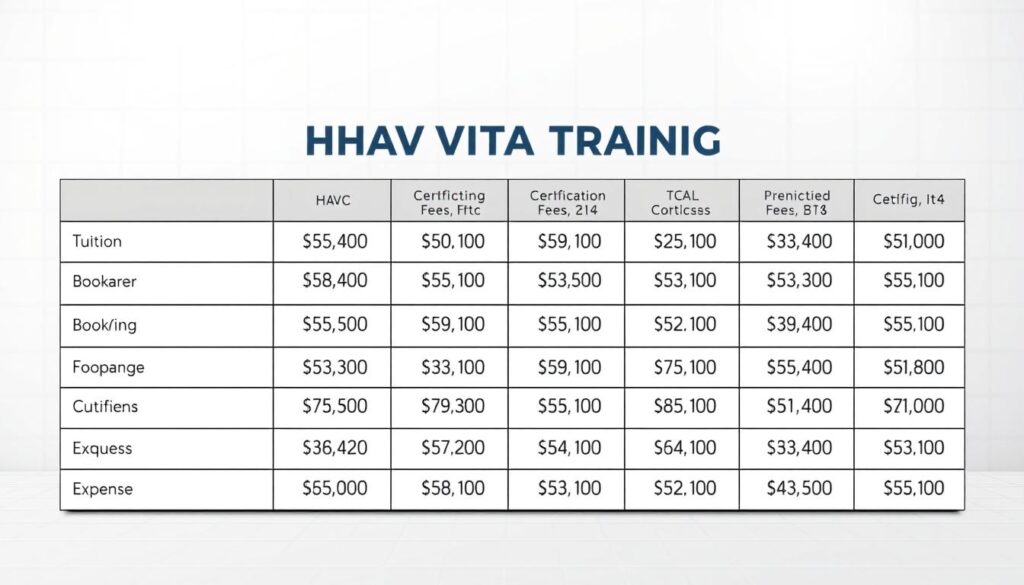Affiliate Disclosure
HVAC Guide Guys is a participant in the Amazon Services LLC Associates Program, an affiliate advertising program designed to provide a means for sites to earn advertising fees by advertising and linking to Amazon.
How Long Does HVAC School Last? Ever wondered how quickly you could start a successful HVAC career? Knowing how long HVAC school lasts is your first step. It leads to a rewarding job that mixes skill, innovation, and high demand.

HVAC training programs offer flexible paths for future technicians. You can choose from short-term certificates to full associate degrees. The length of HVAC school depends on your goals and how much you want to learn.
Trade schools and technical institutes have various HVAC programs. They fit different schedules and goals. You can pick from 6-month certificates to 2-year associate degrees, based on your needs.
Key Takeaways
- HVAC training duration varies from 6 months to 3 years
- Certificate programs offer faster entry into the workforce
- Associate degrees provide more complete technical education
- Employment growth for HVAC technicians is projected at 5% through 2031
- Hands-on training is key for career success
Table of Contents
Overview of HVAC Training Programs
Exploring HVAC training programs opens up exciting career opportunities in a growing industry. The path to becoming an HVAC technician involves various educational routes. These routes cater to different learning styles and career goals. Your hvac certification program length can vary significantly, depending on the type of training you choose.
Potential students have multiple options for their hvac technician course timeline:
- Trade School Programs: Shortest option, typically 6-12 months
- Community College Associate Degrees: 18-24 months of training
- Apprenticeship Programs: Up to 5 years of hands-on learning
Types of Available Programs
HVAC training programs provide diverse pathways to enter the field. Trade schools offer quick, focused training that can be completed in as little as six months. Community colleges provide more extensive two-year associate degree programs. These programs include both technical skills and general education courses.
Industry Growth and Career Prospects
The HVAC industry shows promising growth. The U.S. Bureau of Labor Statistics projects approximately 42,500 annual job openings for HVAC technicians between 2023 and 2033. Technicians can expect competitive earnings, with median hourly wages ranging from $17.79 to $24.33 depending on experience and location.
Basic Requirements for Enrollment
To start your HVAC training, you’ll typically need:
- High school diploma or equivalent
- Basic math and reading skills
- Physical fitness for hands-on work
- Interest in technical and mechanical systems
The increasing complexity of modern HVAC systems makes formal training essential. Certifications like EPA Section 608 are key for handling refrigerants. They show professional competence in the field.
Explore Our HVAC Shop
Looking for top-rated HVAC tools, parts, and accessories? Visit our shop and find the perfect solution for your needs.
Visit the ShopHow Long Does HVAC School Last
Thinking about a career in heating, ventilation, and air conditioning? It’s important to know how long HVAC school lasts. The time you spend in school depends on the program you pick. There are many ways to start your HVAC journey.
There are different lengths for HVAC training. This lets you choose what fits your schedule best. Here are the main program lengths:
- Certificate Programs: Usually 6-12 months
- Associate Degree Programs: About 2 years
- Apprenticeship Programs: Can last up to 4 years
How long you’re in HVAC school depends on a few things. Full-time students finish faster than part-time ones. Some programs let you learn quicker with accelerated options.
“Hands-on experience is as important as classroom learning in HVAC training,” says industry expert Mark Rodriguez.
Most HVAC programs include lots of hands-on training. You’ll get about 135 hours of real-world practice. You’ll learn key skills like working with refrigerants and electrical systems.
Choosing your path affects how long and what you learn in HVAC school. Whether you go for a quick certificate or a two-year degree, you’ll gain valuable skills. These skills are key for a successful HVAC career.
Explore Our HVAC Shop
Looking for top-rated HVAC tools, parts, and accessories? Visit our shop and find the perfect solution for your needs.
Visit the ShopUnderstanding HVAC Certification Pathways
Exploring HVAC certifications can seem daunting, but it’s key for your career. These certifications show your skills and boost your job chances in the HVAC field.
The length of your HVAC certification program varies. It depends on several important credentials. These validate your skills, leading to better job opportunities.
NATE Certification Requirements
NATE stands as the top HVAC certification. To get it, you must:
- Pass detailed exams
- Show your hands-on skills
- Have work experience
HVAC Excellence Certification Process
HVAC Excellence has certifications for all career levels. The process includes:
- Finishing a recognized training
- Passing exams at a professional level
- Keeping up with continuing education
EPA Section 608 Certification
The EPA Section 608 is a must for those working with refrigerants. You’ll need to pass exams on:
- Refrigerant handling basics
- Type I, II, or III certification
- Clean Air Act rules
| Certification | Typical Duration | Key Requirements |
|---|---|---|
| NATE | 6-12 months | Work experience + knowledge exam |
| HVAC Excellence | 3-18 months | Training program + professional exam |
| EPA Section 608 | 3-6 months | Refrigerant handling exam |
Pro tip: Spending time on these certifications can greatly improve your HVAC career and possibly raise your income.
Explore Our HVAC Shop
Looking for top-rated HVAC tools, parts, and accessories? Visit our shop and find the perfect solution for your needs.
Visit the ShopCore Components of HVAC Training
Your HVAC technician course timeline is a detailed journey. It gets you ready for a career in heating, ventilation, and air conditioning. You’ll learn key skills for success in this field.
- Safety protocols and workplace standards
- Electrical systems and motor diagnostics
- Refrigeration principles
- Commercial and residential system design
- Troubleshooting and repair techniques
Vocational training is all about hands-on learning. It turns book knowledge into real-world skills. You’ll learn about complex systems, from electrical controls to thermal dynamics.
“Mastering HVAC requires both technical expertise and practical problem-solving skills.” – HVAC Industry Professional
The HVAC skills timeline starts with basics and moves to complex topics. You’ll learn to analyze and fix systems step by step.
During your training, you’ll become skilled in:
- Reading technical schematics
- Performing system diagnostics
- Understanding refrigerant management
- Implementing energy-efficient solutions
Your training prepares you not just as a technician, but as a critical problem solver in the modern built environment.
Factors Affecting Training Duration
Your HVAC training time can change a lot based on several important factors. Knowing these helps you plan your education better and set realistic goals for your training time.
How you study and your personal life can greatly affect your education time. Let’s look at the main things that can change how long you’ll study for your HVAC career.
Full-Time vs Part-Time Study Options
Choosing how you study affects how long it takes:
- Full-time programs finish quicker (6-12 months)
- Part-time takes longer (18-24 months)
- How flexible it is depends on your work and life
Prior Experience Considerations
Having relevant experience can speed up your learning:
- Experience in mechanics or electricity can shorten training
- Skills from the military or technical jobs can help you get certified faster
- Some programs give credits for professional experience
Program Intensity Levels
| Program Type | Duration | Intensity |
|---|---|---|
| Certificate Program | 6-12 months | High |
| Associate Degree | 18-24 months | Moderate |
| Apprenticeship | 3-5 years | Comprehensive |
Your learning speed, available time, and career goals will decide the best HVAC training for you.
Explore Our HVAC Shop
Looking for top-rated HVAC tools, parts, and accessories? Visit our shop and find the perfect solution for your needs.
Visit the ShopSkills and Knowledge Acquisition Timeline

Your HVAC skills journey is a structured path from beginner to expert. The length of your hvac academic program can be from 6 months to 2 years. This depends on your educational choice.
Professional HVAC training has several key stages:
- Foundation Learning (First 3-4 Months)
- Basic electrical theory
- Introduction to HVAC systems
- Safety protocols
- Technical Skill Development (Next 6-9 Months)
- Advanced system diagnostics
- Refrigeration principles
- Hands-on equipment repair
- Specialized Certification Preparation (Final Months)
- EPA Section 608 Certification
- Advanced troubleshooting techniques
- Professional practice standards
Your learning combines theory and practice. This ensures you gain the skills needed in the industry.
| Training Phase | Key Skills Developed | Estimated Duration |
|---|---|---|
| Initial Learning | Basic system understanding | 3-4 months |
| Technical Mastery | Advanced repair techniques | 6-9 months |
| Professional Certification | Industry standards compliance | 2-3 months |
Strategic skill development ensures you’re prepared for a dynamic and rewarding HVAC career.
Career Preparation and Job Placement
Your HVAC education is more than just classroom learning. It’s about turning you into a job-ready candidate. You’ll learn strategies for a strong career.
Getting ready for an HVAC career is a journey. It includes support to help you smoothly move into the workforce. Top HVAC schools focus on making you ready for the job.
Industry Partnerships
Being connected to the industry is key to your growth. These partnerships open doors to new opportunities. They link students with employers.
- Networking with local HVAC companies
- Access to exclusive job boards
- Direct recruitment channels
Internship Opportunities
Internships are vital for real-world experience. They last 6-12 months. You’ll get hands-on training in a professional setting.
“Internships bridge the gap between academic knowledge and practical skills” – HVAC Industry Expert
Resume Building Support
Training programs help you build a strong resume. They offer:
- Professional resume writing workshops
- Portfolio development guidance
- Interview preparation sessions
HVAC technicians earn a median of $57,300 a year. With a 9% growth rate, it’s a great time to prepare for a career.
Explore Our HVAC Shop
Looking for top-rated HVAC tools, parts, and accessories? Visit our shop and find the perfect solution for your needs.
Visit the ShopCost and Financial Considerations

Understanding the cost of HVAC vocational training is key for those starting out. The price for HVAC programs can vary a lot. It can range from $1,500 to $30,000, depending on the program and school.
There are different costs for your training:
- Certificate Programs: 6-12 months, costing between $1,200 and $15,000
- Associate Degree Programs: 2 years, ranging from $15,000 to $35,000
- Apprenticeship Programs: 3-5 years, with registration costs between $500 and $2,000
Financial aid can help lower what you have to pay. Many schools offer:
- Scholarships specific to HVAC training
- Federal and state grants
- Student loans
- Employer tuition reimbursement programs
Community colleges are often cheaper. Public in-state tuition averages $4,868 per year. Don’t forget to add costs for tools ($500-$3,000), books ($500-$1,000), and certification exam fees ($200-$500) to your budget.
Investing in your HVAC education can lead to a median annual wage of $51,340, making it a potentially lucrative career path.
Conclusion
Knowing how long HVAC school lasts is key for planning your career. HVAC training can take from 6 months to 4 years. This depends on the program and your goals.
Whether you choose a vocational program, certificate, or associate degree, each offers unique skills. These skills are vital in the heating, ventilation, and air conditioning field.
Investing in HVAC training can greatly boost your future earnings. HVAC techs with some college education can earn about $1.8 million over their lifetime. This is $200,000 more than those with just a high school diploma.
This financial gain makes the time spent in HVAC training worthwhile. It’s a smart career investment.
The HVAC training landscape is flexible, fitting your learning style and schedule. You can pick from eight-week programs to two-year degrees and apprenticeships. This flexibility helps you find a path that suits you.
Remember, continuous learning and staying current with certifications boost your career. This is important in the fast-changing HVAC industry.
By choosing the right HVAC training, you’re not just learning a trade. You’re setting up a rewarding and potentially lucrative career. Your dedication to education today will lead to many opportunities in the growing HVAC industry.
FAQ
How long does a typical HVAC training program take?
What are the different types of HVAC training programs available?
Do I need any prior experience to start an HVAC training program?
What certifications will I need to become a professional HVAC technician?
Can I study HVAC training part-time?
What is the typical cost of HVAC training?
How long does a typical HVAC training program take?
What are the different types of HVAC training programs available?
Do I need any prior experience to start an HVAC training program?
What certifications will I need to become a professional HVAC technician?
Can I study HVAC training part-time?
What is the typical cost of HVAC training?
FAQ
How long does a typical HVAC training program take?
The time it takes varies. Certificate programs last 6-12 months. Associate degree programs take 2 years. Apprenticeships can last 3-5 years. Your choice and study pace will decide how long it takes to finish your HVAC education.
What are the different types of HVAC training programs available?
You can pick from several HVAC training options. There are short-term certificate programs, two-year associate degree programs, and apprenticeships. Each offers different levels of education and hands-on training for a career in HVAC.
Do I need any prior experience to start an HVAC training program?
Most HVAC programs accept students with no experience. You need a high school diploma or GED, basic math and reading skills, and physical fitness. Some programs might have extra requirements, so it’s good to check with the schools.
What certifications will I need to become a professional HVAC technician?
You’ll need three main certifications. These are EPA Section 608 Certification for refrigerants, NATE Certification for technical skills, and HVAC Excellence Certification. These show your skills and can help you find better jobs in HVAC.
Can I study HVAC training part-time?
Yes, many HVAC programs offer part-time options. Part-time study takes longer but lets you balance school with work or other life commitments. Full-time programs are quicker but require more time.
What is the typical cost of HVAC training?
HVAC training costs vary. Certificate programs cost between
FAQ
How long does a typical HVAC training program take?
The time it takes varies. Certificate programs last 6-12 months. Associate degree programs take 2 years. Apprenticeships can last 3-5 years. Your choice and study pace will decide how long it takes to finish your HVAC education.
What are the different types of HVAC training programs available?
You can pick from several HVAC training options. There are short-term certificate programs, two-year associate degree programs, and apprenticeships. Each offers different levels of education and hands-on training for a career in HVAC.
Do I need any prior experience to start an HVAC training program?
Most HVAC programs accept students with no experience. You need a high school diploma or GED, basic math and reading skills, and physical fitness. Some programs might have extra requirements, so it’s good to check with the schools.
What certifications will I need to become a professional HVAC technician?
You’ll need three main certifications. These are EPA Section 608 Certification for refrigerants, NATE Certification for technical skills, and HVAC Excellence Certification. These show your skills and can help you find better jobs in HVAC.
Can I study HVAC training part-time?
Yes, many HVAC programs offer part-time options. Part-time study takes longer but lets you balance school with work or other life commitments. Full-time programs are quicker but require more time.
What is the typical cost of HVAC training?
HVAC training costs vary. Certificate programs cost between $1,200 and $15,000. Associate degree programs cost $10,000 to $30,000. Financial aid, scholarships, and grants can help make HVAC education more affordable.
What subjects will I learn in an HVAC training program?
You’ll learn important technical skills. This includes electrical systems, refrigeration, system components, safety, heating and cooling, and troubleshooting. You’ll get both theoretical knowledge and practical experience.
How long does an HVAC apprenticeship typically last?
HVAC apprenticeships last 3-5 years. They combine classroom learning with paid on-the-job training. This way, you earn while you learn and get a lot of practical experience.
Are online HVAC training programs available?
Yes, many schools offer online or hybrid HVAC programs. These mix online learning with in-person training. While flexible, most programs include some in-person training for hands-on skills.
What are the job prospects after completing HVAC training?
The HVAC industry is growing fast. The Bureau of Labor Statistics says it will grow 13% by 2028. Skilled technicians are in demand, with good salaries and job security in residential, commercial, and industrial sectors.
,200 and ,000. Associate degree programs cost ,000 to ,000. Financial aid, scholarships, and grants can help make HVAC education more affordable.
What subjects will I learn in an HVAC training program?
You’ll learn important technical skills. This includes electrical systems, refrigeration, system components, safety, heating and cooling, and troubleshooting. You’ll get both theoretical knowledge and practical experience.
How long does an HVAC apprenticeship typically last?
HVAC apprenticeships last 3-5 years. They combine classroom learning with paid on-the-job training. This way, you earn while you learn and get a lot of practical experience.
Are online HVAC training programs available?
Yes, many schools offer online or hybrid HVAC programs. These mix online learning with in-person training. While flexible, most programs include some in-person training for hands-on skills.
What are the job prospects after completing HVAC training?
The HVAC industry is growing fast. The Bureau of Labor Statistics says it will grow 13% by 2028. Skilled technicians are in demand, with good salaries and job security in residential, commercial, and industrial sectors.

